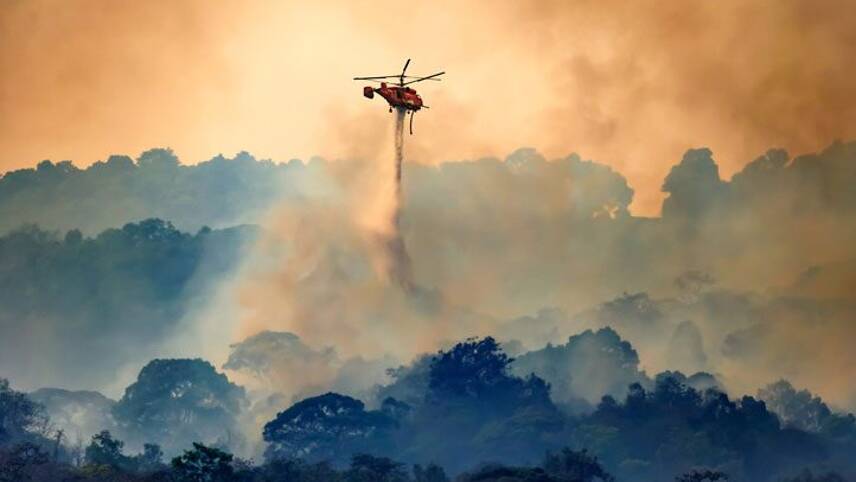Register for free and continue reading
Join our growing army of changemakers and get unlimited access to our premium content

Pictured: A helicopter drops water on a forest fire. Wildfires are made more likely by climate change and have killed hundreds of people and rendered thousands homeless this year.
Published today (6 September), the editorial warns that, while recent targets to reduce emissions and conserve nature are welcome, they are “not enough” and are “yet to be matched with credible short- and longer-term plans”.
It urges governments to intervene to transform societies and economies, for example by supporting the redesign of transport systems, cities, production and distribution of food, markets for financial investments, and health systems.
Such investments, it insists, will produce huge positive benefits, including high-quality jobs, reduced air pollution, increased physical activity, and improved housing and diet.
Better air quality alone would realise health benefits which “easily offset the global costs of emissions reductions”.
The measures will also improve the social and economic determinants of health, the poor state of which may have made populations more vulnerable to the Covid-19 pandemic.
Road to COP26
The editorial is being published in advance of the UN General Assembly, one of the final international meetings taking place before the COP26 climate conference in Glasgow in November.
This is the first time so many journals have combined to publish the same editorial, according to the British Medical Journal.
Journals the editorial will be published in include: The Lancet, the East African Medical Journal, the Chinese Science Bulletin, the International Nursing Review, the National Medical Journal of India, The British Medical Journal, and the Medical Journal of Australia.
Warnings about the urgent need to tackle climate change have been ramping up ahead of COP26.
The latest report published by the Intergovernmental Panel on Climate Change (IPCC) warned the window in which to deliver the “deep emissions cuts” needed to prevent the worst impacts of the climate crisis is “closing rapidly”.
For decades, health professionals and health journals have warned of the severe and growing impacts on health from climate change and the destruction of nature.
Last month, the University College London Hospitals NHS Foundation Trust outlined plans to reach net-zero operational carbon emissions by 2031, emphasising the impacts of the climate crisis on public health.
edie’s COP26 Focus Week
With less than two months until COP26, the edie team is running a dedicated week of content including exclusive interviews, in-depth reports and insightful opinion pieces this week (6-10 September).
Don’t miss your chance to get involved; click here to read more about our full programme of content and events and click here to register for this week’s biggest event – the online Inspiration Sessions on Nature-Based Solutions and Climate Adaptation. Taking place o Thursday 9 September, the online event effectively combines three edie webinars into a single afternoon, with speakers confirmed from organisations including Unilever, Grosvenor and the FAIRR Initiative.
edie staff


Please login or Register to leave a comment.